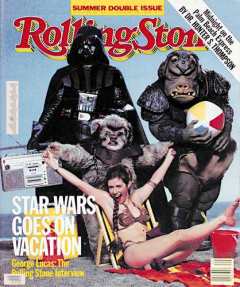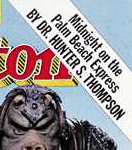Covers and Pictures
+ Seventies+ 1972 Election
+ Seventies Pt. 2
+ Eighties
+ Nineties
+ 2000s
+ The Corporate Giggle
+ The Battle of Aspen
Articles and Essays
+ Fear and Loathing in Elko+ A Dog Took My Place
+ Mr. Bill's Neighbourhood
+ The Taming of the Shrew
+ Strange Rumblings in Aztlan
+ Hey Rube! I Love You!
+ John Belushi
Bibliographies
+ 1970s+ 1980s
+ 1990s
+ 2000s
"A Dog Took My Place"
Page added 1997
Last updated: July 2005
This is one of the few articles that HST wrote for Rolling Stone in the eighties (RS 400, July 21/August 4, 1983) and is reprinted as "Bad Craziness in Palm Beach; I Told her it was Wrong" in Songs of the Doomed.

It appeared as one of three articles by HST in the huge tome, 20 Years of Rolling Stone. The original cover (see pic) was headlined "Midnight on the Palm Beach Express" while the cover featured The Return of the Jedi. A large illustration by Ed Sorel accompanied the article. It is a loose watercolour of several couples having sex while a butler presents them a platter with various sex toys. The butler has the perfect "Just ignore it" look on his face. The figures are outlined in black ink.

It's a long fun article about the "Palm Beach lifestyle", which HST explained later to David Letterman. Roxanne Pulitzer's long and publicized divorce trial attracted HST - it was the perfect story for gonzo. A&E produced an "American Justice" special about the case (minus HST) in 1996, and Roxanne wrote her own book about the affair, The Prize Pulitzer in 1987. She also wrote other "fiction" titles afterwards - namely The Palm Beach Story.
HST actually met Roxanne during the trial and ended up at her house for dinner. A friend told her not to ever read the article, and allegedly she never has [* Pulitzer read the piece at the HST Homecoming in Louisville]. A picture of Roxanne laughing while HST wags his finger at her appears in When the Going Gets Weird by Peter O. Whitmer. The article caused a huge sensation and was trimmed for libel purposes. Needless to say, it sold like hotcakes, but unlike Whitmer, I'm inclined to think it's mostly because of the Star Wars cover.
Whitmer draws some interesting connections between the two, actually; Roxanne was at a party in Aspen where she was served a plate with "Happy Birthday Rox" spelled out in cocaine. Both are friends of Jimmy Buffett, and, according to Whitmer, Roxanne resembled a younger version of Hunter's ex-wife, Sandy (Whitmer, p265). HST had his own divorce behind him (probably he has not written more than twenty words on the subject; yet wrote fondly of Sandy).
Roxanne was married to Herbert (Peter) Pulitzer, but the relationship disintegrated...threats about child custody and outlandish spending soon turned into shocking relevations of overindulgence of the most curious kind - group sex, booze, drugs, and lesbianism. The most hilarious accusation was that Roxanne had "slept with a trumpet". HST told the Palm Beach Post, "We all sleep with trumpets. The real question is, is Peter Pulitzer jealous of the trumpet?" (Whitmer, p265).
Ever valiant and able to report honestly in such matters, HST joined the throngs of journalists who crowded for a spot in the court room. There was one closed-circuit TV for those who didn't make the 7 AM press deadline, and even then, inside the court resembled a sporting event, with bleacher seats. The spectators were
a rowdy mixture of everything from CBS-TV producers to lanky six-foot women with no bras and foreign accents who claimed to be from Der Spiegel and Paris Match. It was a lusty crowd, following the action intently, sometimes cheering, sometimes booing. It was like a crowd of stranger who came together each day in some musty public room to watch a TV soap opera like "General Hospital". On one afternoon, when Roxanne Pulitzer lost her temper at some particularly degenerate drift in the testimony, the bleachers erupted with shouting: "Go get 'em, Roxy! Kick ass! That's it, Rox baby! Don't let them talk that way about you!" (Thompson, 1990, p194).
The nut of the story is an old one, a "tale of Cinderella gone wrong". A young working-class woman marries the middle aged grandson of the famed publisher. He realizes that he has made a mistake; according to him, she was nothing but a gold-digger and an "incorrigible coke slut" and an unfit mother to boot. Allegedly she stayed up late and "humped almost everything she could get her hands on", including a French baker, a real-estate agent, "self employed handyman", her dope dealer and a "pansexual troilist" (Thompson, 1990, p194-195). But, HST finds out, "Roxanne Pulitzer is not a beautiful woman...she looks more like a jaded senior stewardess from Pam Am". Her secret is her "good-humored, out-front sexuality". She is "clearly a woman who likes to sleep late in the morning" (Thompson, 1990, p195).
As HST sits in on the trial and tries to find the real meaning, he discovers that these are his kind of people, who report spending $441, 000 on "miscellaneous and unknown" while the figure for the previous year was just $99, 000. HST figures that it was spent on cocaine, a "genuinely awesome rate of consumption - something like thirteen grams a day" which is enough "to kill a whole family of polar bears" (Thompson, 1990, p198).
The story swings back and forth between these two extremes: the trial, and the "Palm Beach Express".
Towards the end of the article, HST feels that he has become one with the community. Instead of "I" he uses "we", particularly to describe the role of police in the area:
"The police are no problem in Palm Beach. We own them and they know it. They work for us, like any other servant, and most of them seem to like it. When we run out of gas in this town, we call the police and they bring it, because it is boring to run out of gas. The rich have special problems, and running out of gas on Ocean Boulevard on the way to an orgy at six o'clock on Sunday morning is one of them. Nobody needs that. Not with naked women and huge bags of cocaine in the he car. The rich love music, and we don't want it interrupted.
.
.
.
"We don't pay these people much, but we pay them every week, and if they occasionally forget who really pays their salaries, we have ways of reminding them" (Thompson, 1990, p206).
The problem with the Pulitzers, HST concludes, is that they failed "to understand the nature of the Social Contract" (Thompson, 1990, p206) and should be banished from the West Coast. The Pulitzers are such people, who disturbed the residential community and caused much unwanted attention. HST circles back to the beginning nicely in this way. He describes Palm Beach as a residential community with no "jails or hospitals". It is an "elaborately protected colony for the seriously rich, a very small island and a very small world". In a way, it seems like HST's home in Woody Creek - "the rules are different here, or at least they seem to be, and the people like it that way" (Thompson, 1990, p191).
Palm Beach is a place where reality does not apply, "money is cheap" and there is no "place for Horatio Algers". HST has tapped into a raw form of free enterprise where "hard work and clean living will get you a bag of potato chips and a weekend job scraping scum off the hull of your neighbour's new Cigarette boat" (Thompson, 1990, p193).
Nakedness is also part of the scene, and HST finds himself in a red Chrysler convertible with naked lesbians on their way to an orgy.
Bestiality is another aspect of the lifestyle, because it is felt to be a victimless crime in Palm Beach, even though it is technically against the law. This is where the title comes from. First, HST meets a woman whose friend makes $50, 000 a year (tax-free) to screw dogs for rich people; then HST meets a bartender who feels like a "beast". He tells HST, "I see those s--t-eating grins on their faces and I feel like a dog took my place." This leads back to the final ending where HST decides that it is better to get involved with animals than people, "because they will never call the police on you or take you in front of a judge or run off and hide with your money...Animals don't hire lawyers" (Thompson, 1990, p206).p
HST spent a lot of time in the early eighties in depraved tropical places. Two other Palm Beach articles that were unpublished appear in Songs of the Doomed:
"Sugarloaf Key: Tales of the Swine People" (p207-221) - HST gets revenge on the owners of the Sugarloaf Lodge by placing a pig head in the toilet (extremely funny)
"The Silk Road" (p211-226) - this is a small novella where HST tackles fisheads and gets involved in a bar-room shoot out. As he states in the overview: "The Silk Road" is a story about people who got caught in the fast and violent undercurrents and, finally, the core of the action of the great Cuba-to-Key West Freedom Flotilla in the spring of 1980" Skinner and his "hired fiancee" appear. In the end, a man named Colonel Evans is murdered.
If you are interested in reading more about Roxanne Pulitzer, the odd paperback copy of The Prize Pulitzer can be found in used bookstores or online.

